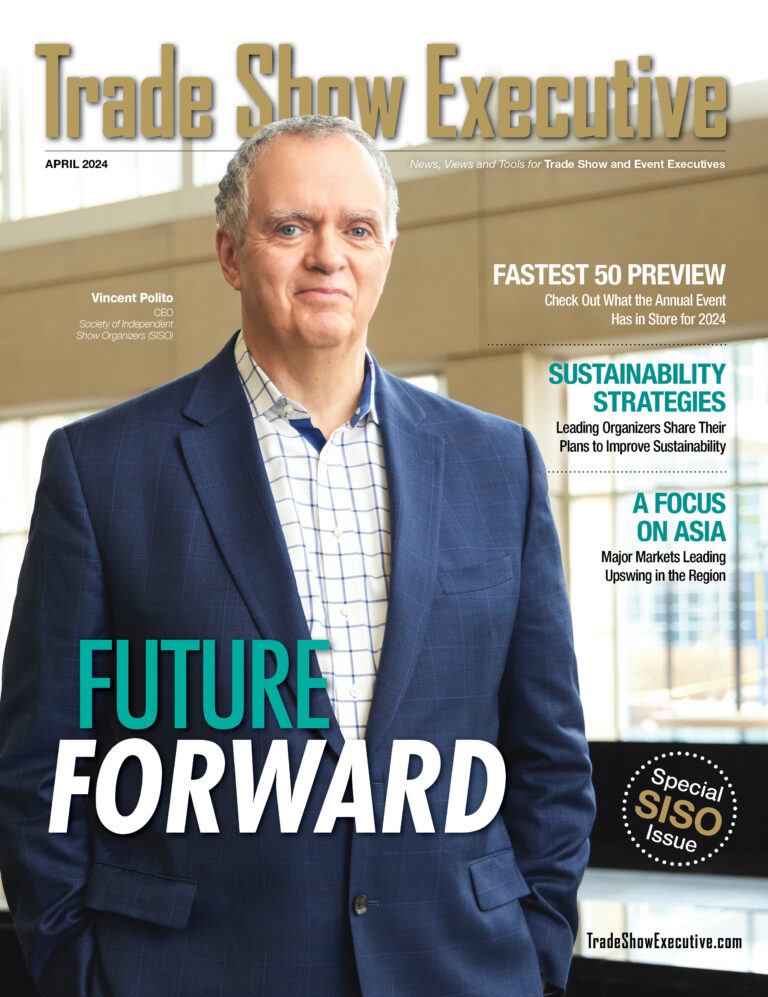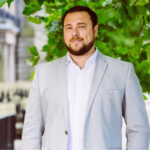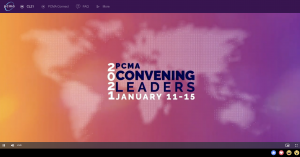 The Professional Convention Management Association (PCMA) is known for innovating, and this year’s hybrid version of Convening Leaders, held January 11-15, was no exception. The meeting combined live gatherings of 50 in Europe and 300 Asia with a robust virtual program that attracted 3,500 attendees from around the globe.
The Professional Convention Management Association (PCMA) is known for innovating, and this year’s hybrid version of Convening Leaders, held January 11-15, was no exception. The meeting combined live gatherings of 50 in Europe and 300 Asia with a robust virtual program that attracted 3,500 attendees from around the globe.
“We’re all bored of the word ‘innovate’ but we will continue to innovate,” said Sherrif Karamat, CAE, PCMA President and CEO, during the press conference. “PCMA is always in beta, always trying to challenge ourselves.”
As challenging as 2020 was for members, it was a banner year for this association, with membership ticking over 8,000 at the end of the year and “massive” growth in Gen Z participation, according to Karamat, “with over 300 Gen Z members actively engaged.”
In addition, PCMA graduated more than 2,900 graduates from its Digital Event Strategist (DES) program, acquired the Corporate Event Marketing Association (CEMA) at the end of 2020, and will kick off a new live event in 2021: Convening EMEA in Lausanne, Switzerland, October 17-19.
PCMA also announced that it will change how it handles its prestigious Chairman’s Award, with this year’s award going to all the PCMA members who have been displaced from their jobs and are in transition. These winners will receive free membership and complimentary access to all educational programs through June 30.
Reach Sheriff Karamat at (312) 423-7262 or skaramat@pcma.org
Following are just some of the highlights from this year’s Convening Leaders.
Opening Session: Pulitzer Prize-Winning Author Thomas Friedman
By Sue Pelletier
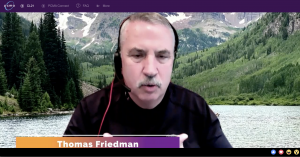 PCMA’s 2021 Convening Leaders started out with a thought-provoking opening keynote by New York Times foreign affairs columnist and Pulitzer-prize-winning best-selling author Thomas Friedman, who provided a glimpse into the three big trends shaping the world today: technology, economic, and geopolitics. And don’t forget Mother Nature.
PCMA’s 2021 Convening Leaders started out with a thought-provoking opening keynote by New York Times foreign affairs columnist and Pulitzer-prize-winning best-selling author Thomas Friedman, who provided a glimpse into the three big trends shaping the world today: technology, economic, and geopolitics. And don’t forget Mother Nature.
Nature throws humanity fastballs from floods and droughts and wildfires to the coronavirus that upended our world recently, he began. Nature “doesn’t reward the smartest. She doesn’t reward the strongest. She rewards the most adaptive,” he said. When it comes to nature, adaptivity rests on our ability to respect what she throws at us, to coordinate your response to it, and to build an adaptation strategy based on chemistry, biology and physics. “You can’t say Mother Nature is just having a bad quarter. She does whatever chemistry, biology and physics dictate.” If you build your adaptation strategy on politics, ideology, or an election calendar, she will hurt you or someone you love, he said.
But COVID- 19 is just the most recent pandemic in our increasingly globally connected world, Friedman added. “In the 25 years since I became a columnist, I realize that all I’ve been doing is covering global pandemics, but of a different kind.” The terrorist attacks of 9/11 were a geopolitical pandemic. The global economic recession in 2008 was a financial pandemic. And SARS was a biological pandemic, as is the current COVID-19 crisis. We still having an atmospheric pandemic called climate change, he added.
“For the past 25 years or so, events that start in one part of the world end up shaking the whole globe.” And each started with a warning “heart attack,” such as in 1998 when the Long-Term Capital Management hedge fund in 1998 faced massive losses after the collapse of the Russian economy. The Federal Reserve and a group of Wall Street banks quickly coordinated to prevent that hedge fund from melting down the global economy. “That was our warning heart attack. In 2008, we got the full coronary.”
The SARS outbreak, which was thwarted due to quick and coordinated action was brought to heel, was the warning sign. In 2019-2020, we got the full SARS coronavirus that causes COVID-19.
Now the extreme heat, droughts, and intensifying weather incidents are our climate change warning heart attacks, he said. “Unlike a virus, climate change doesn’t peak, and there’s no herd immunity.”
Globalization is behind all of these pandemics, he said. Friedman’s book on globalization called The World Is Flat was published in 2005. “The world has gotten so much flatter since then,” he said. “We’re connecting more nodes than ever before.” Connectivity is escalating with 5G technology, binding the world more tightly together. The problem is that while we are becoming more tightly bound, we’re also removing the surge protectors between the nodes, he said.
With 9/11, the buffer was cultural diversity. “What Bin Laden was trying to do was purge the world of Western influence.” For the financial crisis, the buffers were transparency and limits on leverage so one hedge fund couldn’t blow up the whole financial world. With the coronavirus, the buffers are more literal: Those between the wilderness areas and urban areas. As China’s urbanizing developers encroached on those wilderness areas and killed the apex predators, prey animals that have evolved over the millennia with these coronaviruses thrived, were hunted and brought to wet markets, and the virus that is harmless to them jumped to humans.
“Going forward, we have to be very intentional about how we maintain the buffers and surge protectors between the nodes as we use technology to tighten the world. Otherwise, we will continue to see more of these global, world-shaping events.”
Back on the ground level, Friedman talked about what we can expect for the world AC — after coronavirus.
“The biggest thing we’re going to see is an explosion of creative destruction. It’s going to be incredibly exciting, but at the same time incredibly destabilizing.” It will be driven by cheap tools for innovation — such as the cellphones we all carry — that provide access to high-powered computing through the cloud for pennies. At the same time, with interest rates of less than 1%, “money is almost free,” he added.
For adult education, he predicted an existing big trend that will accelerate is the shrinking half-life of workplace skill sets. “The usefulness of what you know today will become obsolete faster tomorrow.”
This will, he said, “blow apart the system of education that has existed since the industrial revolution as something that happens in a school.”
Traditional universities can’t keep up with the accelerating pace of change. “Now businesses have to be employer and educator at the same time, and the best of them are now building huge in-house universities based on just-in-time learning. … Instead of learn, work, retire, now it’s learn, work learn, work, learn, work,” he said. Expect to see more collaboration between companies and universities to provide just-in-time learning for workers, wherever they reside and work.
And the physical workplace also is changing. Companies are becoming platforms where some jobs are done by employees in house and some are done by employees outside the office. Other work is farmed out to gig workers.
“This is going to be the future,” he said. So we as a society need to make sure we have portable pensions, healthcare, and lifelong learning systems to support all the different workers on the company platform, he said. The pandemic has only accelerated this trend.
“When we emerge from this, we’re going to discover a workplace where education no longer happens at the office. Where work no longer happens at the office. Where jobs and companies are all going to become much more disaggregated. As will adult education, which he sees as becoming increasingly hybrid.
But as great as easy, at-your-desk learning is, “My motto as a journalist has always been, ‘If you don’t go, you don’t know.’ You have to be where the ideas can collide, and that comes through that side conversation you weren’t expecting or that novel encounter you had at the reception that sparks a new idea.” We need to continue to find ways to make both work.”
And the leaders are not going to be problem solvers, but problem finders, he said. Think of Steve Jobs — he knew you wanted an iPad before you knew you wanted one.
“It’s going to be an incredibly exciting time. It’s going to be an incredibly destructive time. And managing that creative destruction is going to be the biggest social, economic and political challenge we all face.”
Big Trends Shaping Business Events
By Frances Ferrante
In this session, Laura Citron, CEO, London & Partners; Sherrif Karamat, CAE, President and CEO, PCMA; Keith Tam, CEO, Singapore Tourism Board; and Professor Chan Heng Chee, Ambassador-at-Large and Chair, Lee Kuan Yew Center for Innovative Cities, discussed how COVID-19 has altered the face of business events by showing us what aspects of them can be done differently but also what about them is irreplaceable.
“When people describe events, I never hear the words ‘education’ and ‘learning’ as much as I hear about networking and those serendipitous interactions that happen there,” said Tam. “We need to think harder about how we can design events to contribute to learning. It’s not just about great speakers, it’s about how you design the event to create more ‘Aha’ moments.’’
One thing COVID-19 taught the industry is that technology is not an enemy, but an enabler, allowing people from around the globe to come together. “We were very comfortable in one channel — face-to-face meetings at traditional venues — and did not explore other channels, such as digital,” said Karamat. “We need to be ready to create value and deliver content through diverse options so that if this happens again, we will not be halting business.”
Citron believes that the COVID crisis has put travel at a premium and that people who travel to big cities like London for conventions will now include time for leisure as part of their visit. “People are thinking much harder about traveling and its value has become much higher.”
All the panelists were in agreement that the current pandemic will not be our last, and the alternative models for meeting that we are putting in place are laying the groundwork for the future. “Our first instinct with COVID was to draw from hotels who had staff who were around during SARS and could advise us,” said Tam. “This will now differentiate a venue, to know that they have learned from this pandemic and are ready for the future.”
COVID-19 has created a pent-up demand for live events and a realization of the importance of live interaction. Professor Chan Heng Chee was optimistic about the return of the event industry: “Many people want to travel, and there will be pent-up demand. People will be looking for quality events, and when you also include a hybrid component, you can bring in the rock stars. Being beamed in will no longer be a compromise.”
Innovating Business Events
By Frances Ferrante
PCMA has always been a leader when it comes to innovation, and several sessions at Convening Leaders explored this topic, including two on Thursday, when Sheriff Karamat, CAE, President and CEO, also announced the creation of the Response Room in conjunction with IMEX and the German Convention Bureau.
“As we go through this period of accelerated pressure, it focuses on the need to bring solutions to complex challenges. COVID has been an accelerant of trends that are already happening,” he said. “With the Response Room, we will share real case studies, challenge traditional thinking, innovate and ideate. We will bring in different sectors, industries and cultures from around the world so we can learn together. And we will fail so we can learn and grow together.”
IMEX CEO Carina Bauer spoke about how her team took a chance with the creation of Planet IMEX, a gamification-inspired approach to a trade show. “We truly had to innovate, to look at every element of our shows and find their strategic purpose,” she said. “Innovation is about experimenting and trying new things. We wanted to create a sense of joy and for people to have a smile on their faces like they do when they come into the real show.”
In Innovating Business Events, Stephen Rose, Head of Global Communications Services, Siemens AG, also pointed to the gaming industry as a model. “The gaming industry does things right, like Twitch, the gaming streaming platform. There must be something there that we can use in the events industry.”
Another innovative industry that event designers could learn from, he said, is aerospace. “Every day, they are breaking new ground. They need to launch a rocket, land it and bring it back based on paramaters they do not know.” It’s the same with an event — it must be flawless even if it has never been done before.”
Our industry has to up its innovation game to attract attendees to future events, especially since companies have experienced significant savings in travel expenses during this period. “What is the motivator for people to hop on a plane to come to a venue, especially internationally?” said Rose. He predicts a reworking of meeting architecture to evaluate what has to happen live and what can be delivered digitally.
“Exhibits can stay on site, but pure product presentations where we need to dig deep into a product could be done in a virtual space. Trade shows will see a complete redesign of the booths, with a bigger-sized meeting area and socializing area. There will be topics presented but maybe not products, because people are there to be together.” Rose also foresees exhibitions that move around, like a road show, to where the audience is.
“We will see a Renaissance of in-person meetings, but I don’t think it will come back as it was before. People have experienced so many kinds of virtual meetings that they will expect increased complexity on the hybrid side as well.”
We Have Vaccines. Are We Back To Normal Yet?
By Frances Ferrante
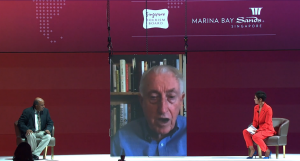
A session with the Nobel Laureate Professor, Peter Doherty, and Dr. Paul Tambyah, President-Elect, International Society of Infectious Diseases, explored the current state of the COVID crisis but also took a look into the future — at what will happen when we face the next pandemic.
There are several nuggets of good news, both agreed. Reports show that airplane spread is extremely rare. There is proof that the antibodies last a long time, with one study of people who contracted SARS 17 years showing that they were still able to neutralize the COVID virus. Influenza has disappeared in places like Australia, in large part due to mask wearing. And there have been mutations of the virus, but not anything like with influenza or HIV.
The most positive news, of course, has been the new vaccines.
We are all in one big experiment, quite frankly,” said Tambyah.
“MRNA vaccines are a new technology, and it is working superbly so far. I think this will be a game changer for influenza as well.”
The next few weeks are going to be critical, he said, because some Middle Eastern countries have already rolled out the vaccine to 10-20% of their populations. “If we see the numbers change, we are going to know very quickly that the vaccine works, and all the conspiracy theories are going to go away. People will be lining up to get the vaccine.”
Doherty expects to see changes in how business events operate, with delegates being required to show evidence of vaccination or to take rapid tests for antibodies. On the entertainment side, bar settings will be discouraged, converted instead to restaurant settings to add space between people. And most important, people will need to continue to wear masks.
“Even before this pandemic, people in certain societies would wear them before to protect themselves from pollution if they have asthma.,” said Doherty. “It is something we are going to have to get used to.”
He believes that countries around the globe should create an agreement so that the next time there is a flare-up like COVID-19, they immediately stop planes from traveling internationally. “That would limit a pandemic at the start,” he said. “We stopped the planes in Australia and New Zealand and we stopped the COVID.”
